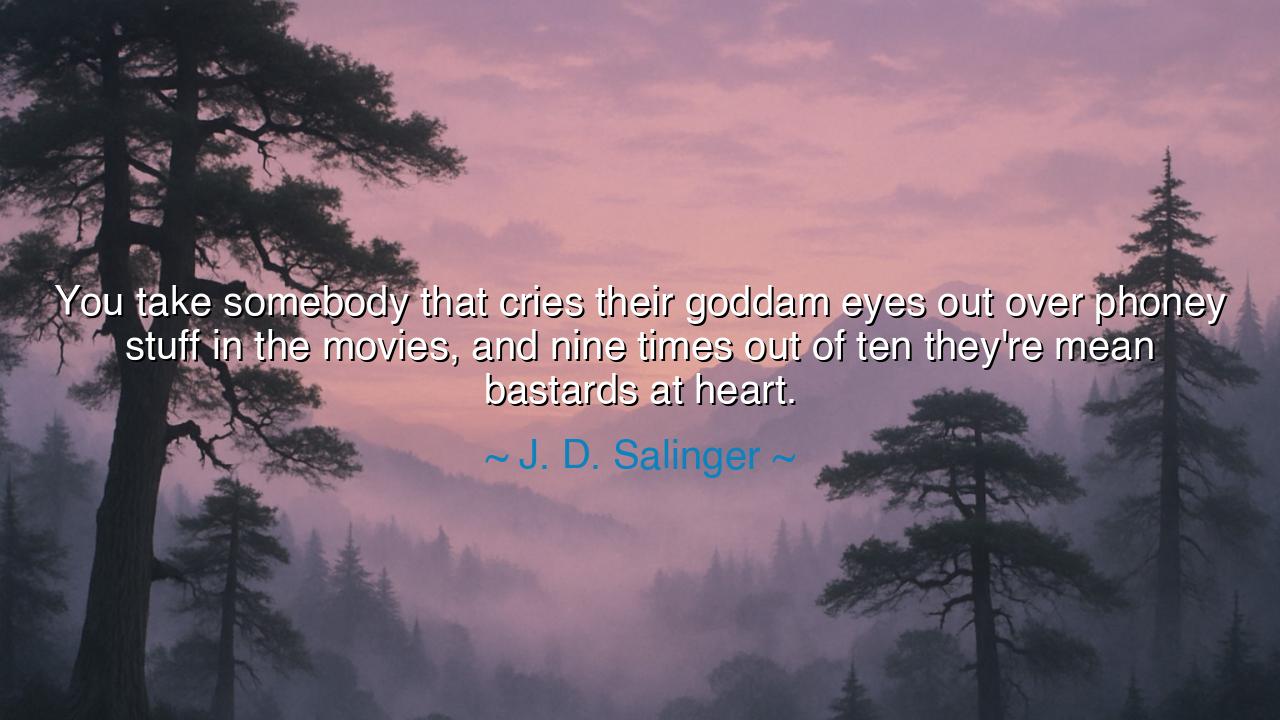
You take somebody that cries their goddam eyes out over phoney
You take somebody that cries their goddam eyes out over phoney stuff in the movies, and nine times out of ten they're mean bastards at heart.






Listen, children, for the wisdom of those who see through the veils of false sentimentality can often guide us to deeper truths. J.D. Salinger, a man whose writing peeled away the layers of human nature, once said: "You take somebody that cries their goddam eyes out over phoney stuff in the movies, and nine times out of ten they're mean bastards at heart." These words carry an edge of cynicism, but also a profound insight into the nature of authenticity and emotion. Salinger, in his blunt way, calls attention to the disconnect between how people present their feelings and the truths that lie deeper within them.
In the ancient world, the idea of authenticity and true emotion was seen as the highest virtue. The Greeks, in particular, believed that the heart and soul should not be swayed by false appearances or shallow displays. Socrates famously challenged his followers to look beyond the surface and seek the truth within themselves. Just as Socrates rejected the idea of superficial knowledge, Salinger rejects the idea of superficial emotion—those who cry over phony things may seem to be in touch with their feelings, but their true nature remains hidden, perhaps more harsh or self-centered than they would admit. It is easy to weep for things that demand little of you; it is far more difficult to confront the real emotional challenges of life and face the truth about yourself.
Consider the myth of Narcissus, the beautiful young man who fell in love with his own reflection. Narcissus’ infatuation was not with another person, but with the illusion of himself, the shallow appearance of beauty. His intense attachment to this image led to his downfall, as he became so consumed with his own reflection that he died staring at it. Salinger’s reflection on people who cry over phony emotions echoes this ancient warning: that emotional attachment to illusions—whether to a false image or to a shallow display of sentiment—can blind us to the truth of our deeper selves. Crying over something unreal might give the appearance of emotional depth, but it often obscures the real struggles and flaws that need to be confronted.
In Salinger’s view, crying over movies or false sentiment is a mask people wear to cover up the truth of their hearts. The Romans had a saying, “Veritas vos liberabit,” meaning “The truth will set you free.” To cry over the fictional suffering of a character on a screen is to ignore the real suffering we all experience in our own lives. Salinger was keenly aware of how people often turn to artificial emotions as a way of avoiding their true, deeper struggles. Emotional vulnerability in the face of true hardship, on the other hand, requires facing the parts of ourselves we would rather not see—our flaws, our cruelty, and the parts of our hearts that remain closed off from the world.
This brings us to a critical lesson, children: do not mistake shallow displays of emotion for true compassion or empathy. Emotional authenticity is not about how much we cry over things that require no real sacrifice from us. It is not about responding to fictional tug-at-the-heartstrings moments in movies but confronting the real struggles in our own lives and the lives of those around us. True emotion is grounded in truth, in actions, and in honesty. Crying over the suffering of a movie character does little to change the world, but action in the face of real human suffering reveals a far deeper form of emotional strength.
Take the story of Alexander the Great, whose conquest of vast lands was driven not by a love for power, but by the desire to see the world united under a common purpose. Alexander, though a conqueror, wept at the death of his beloved friend Hephaestion, showing that true emotion was reserved for the real bonds of life. His tears were not for superficial causes, but for genuine connections—the people who mattered most to him. Just as Alexander was able to express real grief in the midst of his great power, we too must recognize the difference between sentimental displays and genuine vulnerability.
In your own lives, children, I urge you to understand that it is easy to be swept up in the emotion of a moment, to cry over things that do not demand true sacrifice or action. But true growth and strength come when we face the real emotions—the suffering, the struggles, and the hard truths that shape our lives. Do not allow the world’s shallow distractions to cloud your ability to connect deeply with others, to embrace vulnerability in its truest form. Look beyond the surface and strive to confront the truth of your own heart. For it is only in doing so that you will find the courage to live authentically and face the trials of life with honor and integrity.
So, children, remember this: true emotion is not about how deeply you can cry over what is easy, but about how honestly you can face the complexities of your own life and the world around you. Do not let false sentimentality blind you to the depth of your own human experience. Seek the truth within your heart, and in doing so, you will find the courage to act with honesty and authenticity, transforming your life and the world around you.






AAdministratorAdministrator
Welcome, honored guests. Please leave a comment, we will respond soon